Grower profile: WB Chambers
29th March 2023
The Chambers family has grown mixed fruit in Langley, Maidstone since 1648 and now grows around 30 varieties of strawberries, raspberries, blackberries, blueberries and cherries – a strategy that has allowed the farm to meet niche consumer needs as well as providing a risk-averse strategy in cropping patterns. Deputy editor Sarah Kidby reports.
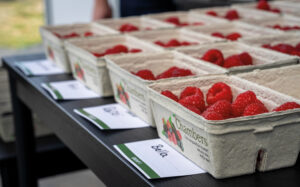
All WB Chambers’ fruit is packaged on the farm.
Grower profile:
- Grower: WB Chambers
- Location: Maidstone, Kent
- Farm size: 1,300 acres (approx.)
- Soil type: Mid-Kent: clay loam; north Kent: sandy loam
- Fruit grown: Strawberries (3,500t), raspberries (3,300t), blackberries (400t), blueberries (150t – set to reach 500t by 2024) and cherries (300t)
With a long history of farming in and around south east Maidstone, the Chambers’ farming enterprise has expanded and shrunk and expanded again over the years, but when current managing director Tim Chambers took over from his father in 1989 it was just 40 acres or so.
Due to the farm’s small size at the time, they had to specialise in a more profitable sector and settled on soft fruits – which fortunately coincided with an increase in consumer demand.
Today, the farm spans around 1,300 acres and grows a wide range of soft fruit varieties, all packed on the farm and sold direct to supermarkets.
Some of Chambers’ main varieties include:
Strawberries: Murano, Favori, Aurora Kareema, Prize
Raspberries: Malling Bella, Nobility and Majestic, plus Rafiki and Serafina from Holland
Blackberries: Loch Ness, Karaka, Sweet Royale
Blueberries: Duke, Bluecrop, Last Call, Top Shelf, Liberty
Cherries: Kordia, Regina, Penny, Sweet Heart.
However, Chambers grows around 30 varieties in total to suit certain niches or customers. Varieties are largely chosen according to customer demand – with shelf life/avoiding waste and good flavour being the most sought-after requirements, Tim explained.
As a farm diversification, WB Chambers also runs importing and service packing provisions businesses, which allows it to supply fruit to UK customers 52 weeks of the year, working with partner farms in Egypt, Morocco, Peru, Chile, Guatemala, Mexico, Spain, Portugal, and Poland.
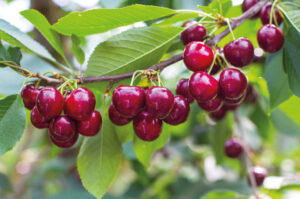
There has been a big push for using predatory insects to control pest insects, however this is far from a perfect solution says Tim.
A shrinking armoury
A key challenge for the farm has been the loss of many ag-chems from the armoury, resulting in a resurgence of pest problems. Tim explained: “I think some of the fungicides we were using even a few years ago were also acting as insecticides in some ways, so they were masking certain issues. When we lost the fungicide Elvaron we suddenly started getting leaf and bud mite, which hadn’t really been a problem for 20 years.”
For strawberries, the farm’s main fungal challenge is mildew followed by botrytis, while in terms of insects it’s thrips and aphids. For raspberries, the key threats are phytophthora, mildew, aphids, two-spotted spider mite and leaf and bud mite.
There has been a big push for using predatory insects to control pest insects, and Chambers’ spend on this method of control has increased dramatically over the past five years. Whilst they may be highly effective in the laboratory, this does not always translate fully to the field and they are far from a perfect solution – but for some pests they are the only option, Tim said. WB Chambers is trying to encourage predatory insects to stay on the farm and breed its own – but the numbers needed to control two-spotted spider mite or thrips is in the millions. “But if the customers want it, we have to do it,” he added.
Effects of extreme weather
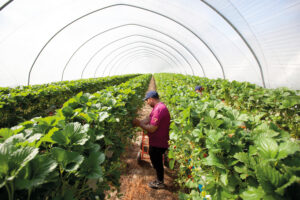
Polytunnels are used to manage frost risk and provide 3–4oC protection.
Another challenge is the increasingly unpredictable and extreme weather conditions. Commenting on the impact of last summer’s extremely hot weather on harvest, Tim said: “The year started very well with a nice, benign spring, steady temperatures and no frost – so the crop potential was very good going into early summer. There were plenty of flowers, the fruit looked a good size and yields were looking good. For all the early crops that remained true, because we managed to pick them off before the heat really hit us in July/August.
“Plants went into stress mode in the excessive heat, meaning farms will have had to wait for cooler weather for them to kick back into the cycle.
“It really hit late yields of product, which would have been initiating flowers through that hot time. It didn’t happen. The plants just didn’t grow, and they didn’t perform as normal. So late yields were impacted, and the quality of that late fruit was impacted because for those flowers that pushed through in that heat, the pollination wasn’t very good,” Tim continued. “Additionally, although plants drink more in hot weather, it’s inefficient because you can’t get water on at the same rate as the uptake. It also causes problems with the uptake of minerals, nitrogen, phosphorous and potassium – hampering growth further.”
On a more positive note, there is currently no other country with a cheaper cost base than the UK for strawberry, raspberry, and blackberry production when they’re in season, so there’s no competition from cheap imports – though this will change in the future, Tim said. Blueberries, on the other hand, can be shipped cheaply and easily from all over the world as they grow in much wider climates.
At the other end of the spectrum, polytunnels are used to manage frost risk and provide 3–4ºC protection. Earlier in the year or if the weather is particularly challenging, fleece is used inside the tunnels to give another 2–3ºC protection.
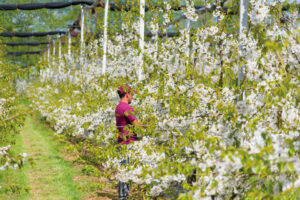
With soil health being critical, soil sampling is done annually, and water moisture content is continual throughout the summer.
Soil health and pollination
For many of its crops, Chambers is moving towards using substrate to give a more reliable crop yield and uniform plant growth/health. Over time soil- and water-borne fungi build up in the soil to levels that economically reduce the crop. The main fungal disease phytophthora, for example, can last for 20+ years once it is in the soil. Only around 5% of the raspberry crop is now grown in the soil, and none of the blueberry crop. Cherries, however, are all grown directly in the soil. With soil health being critical in the growing area, organic matter is mulched in with the cherries and blackberries, soil sampling is done annually, and water moisture content is continual throughout the summer.
For pollination, the farm uses their own beehives as well as local beekeepers, and they also buy bumblebees shipped in from Holland. Bumblebees fly at a lower temperature than hive bees, and therefore work better in the ambient temperatures within the polytunnels which are used early in the year to try to push crops early.
Labour is a significant challenge
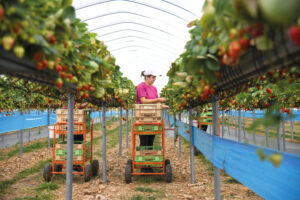
A third of the farm’s labour has right to remain status, while the remainder is sourced from the Seasonal Agricultural Workers Scheme.
Labour is the farm’s biggest cost and profitability challenge, accounting for around 60–70% of its total turnover cost – and this figure is only continuing to rise. Around a third of the farm’s workforce has ‘right to remain’ status, which applies to those workers who could prove they were working in the UK at the time of Brexit and were given leave to remain. The rest of the farm’s pickers are new entrants via the Seasonal Agricultural Worker Scheme (SAWS), which sources workers from 57 countries. Managing several hundred new entrants from around the globe and trying to get them up to picking speed presents a significant and frustrating challenge for the farm, Tim said – coupled with the fact that under the scheme, workers can only remain for six months, and cannot return to the UK for another six months from the date of their departure.
All fruit on the farm is hand-picked, requiring around 1,800 pickers. Although there has been much investment in robotics, Tim reckons this is currently years in the future and current purchase costs are very high. Plus each robot would require a member of staff to take away full trays and grade them, meaning robotics do not currently offer a practical solution to the farm’s labour issues, Tim added.
To keep costs down, as much of the farm’s work as possible is done in-house, with contractors only used in cases where specialist equipment is required. Any machinery that will get a few thousand hours of work a year will be bought new to reduce maintenance bills, with tractors, sprayers, mowers, trailers, pulverisers, forklifts and pallet trolleys being the most heavily used equipment on the farm. More specialised machinery is bought second-hand or the job is contracted out. Like many farms, Chambers has also felt the effects of long wait times for new machinery, due to ongoing global supply issues since the onset of the Covid-19 pandemic.
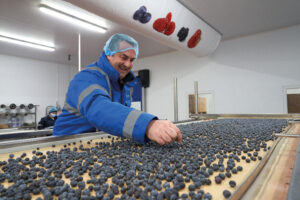
WB Chambers is set to grow 500 tonnes of blueberries per year by 2024. Pictured here is Duke.
Looking to the future
Going forward, the farm’s main aims will be to simplify processes to minimise costs and labour, and to invest further in production overseas. For example, growing 15 different raspberry varieties, all of which require specific growing techniques, provides a risk-averse strategy in cropping patterns. Whilst reducing this number would sacrifice some flexibility and risk reduction, it will also reduce complexity and cost, Tim explained.
Tim is also chair of the East Malling Rubus Breeding Consortium, which breeds, develops and commercialises raspberries and blackberries for global production. Concluding by commenting on the potential varieties of the future, he highlighted two raspberry varieties that were released by the consortium in 2020, Malling Bella and Malling Charm – which offer consistent flavour, good fruit quality and long shelf life. Plus, some numbered selections in the pipeline “look even more promising in yield and quality” and are currently undergoing rigorous trials to test their attributes against pest and disease. Watch this space…
